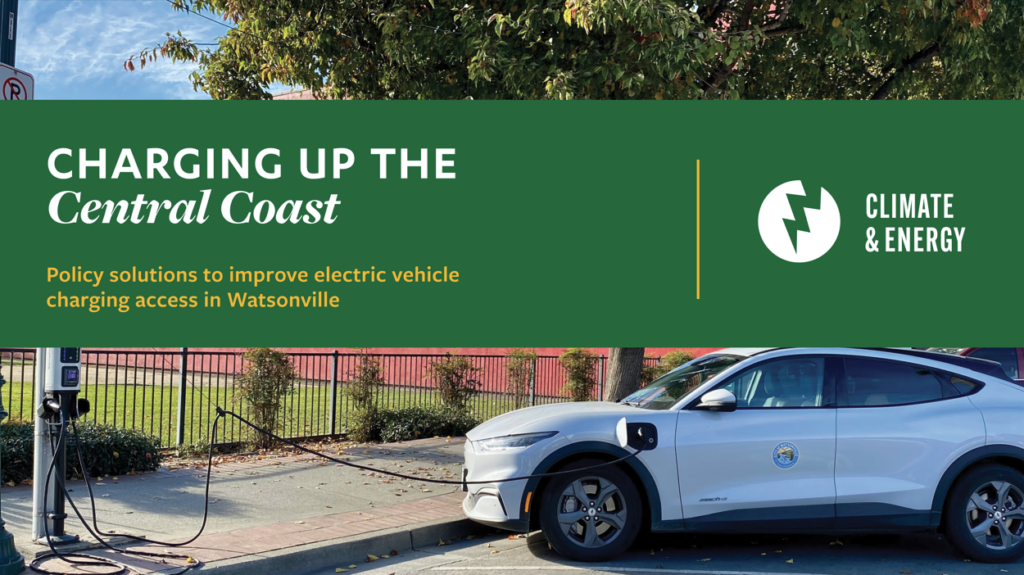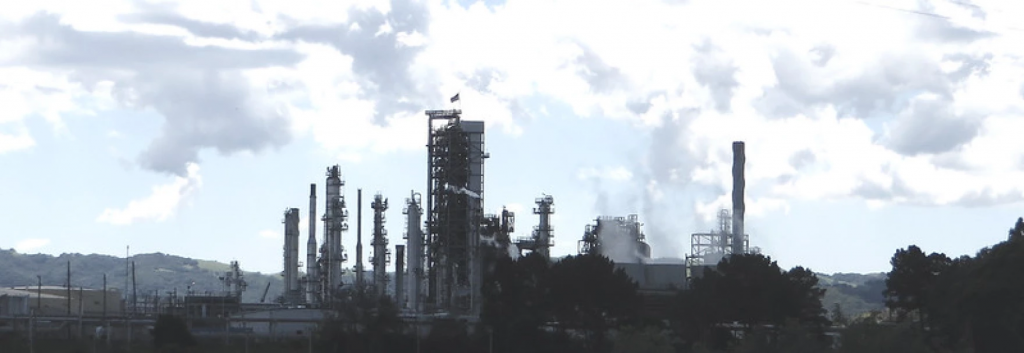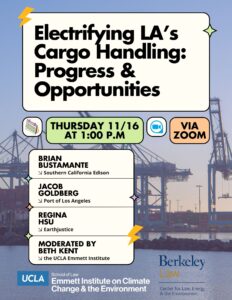California’s ambitious goal to end the sale of internal combustion engine passenger vehicles by 2035 will require addressing the challenges faced by lower- and moderate-income drivers in accessing battery-powered electric vehicles (EVs). Chief among these concerns is their need to have a convenient and affordable place to charge the vehicles.
Currently these residents too often experience limited access to EV charging stations, especially in lower-income communities characterized by lower home ownership rates and higher rates of tenancy in apartment buildings. Residents in these areas are more likely to lack dedicated parking spaces equipped with electric outlets, hindering their ability to charge EVs conveniently. Even those with garages or parking spaces may face financial constraints when it comes to investing in private charging and electrical upgrades. Compounding these challenges is the often-inadequate grid infrastructure in lower-income areas.
In response to these obstacles, UC Berkeley School of Law’s Center for Law, Energy & the Environment (CLEE) partnered with the City of Watsonville, a diverse city of 50,000 in Santa Cruz County’s agricultural heartland. Due to its location, demographics, and ambitious policy goals, Watsonville represents a potential model and case study for other cities around the state grappling with how to boost zero-emission vehicle charging infrastructure.
Today CLEE is pleased to release a new report, which draws on stakeholder interviews and a convening held in Watsonville to offer a set of policy recommendations for both state and local leaders. These recommendations aim to accelerate investment in EV charging infrastructure not only in Watsonville but other cities facing similar challenges in meeting state targets while addressing lower-income residents’ needs.

- Comprehensive Mapping Assessment: Watsonville’s City Planning Department and Public Works & Utilities Department could initiate a comprehensive mapping assessment to determine optimal and equitable charger locations based on local needs and transportation patterns.
- Zoning and Permitting Policies: Watsonville’s City Planning Department could revise zoning and permitting policies to require EV charger installation or EV-ready electrical infrastructure at certain priority locations.
- Electricity Rate Optimization: The CPUC and utility companies could implement electricity rates that reduce the cost of charging during off-peak hours and improve transparency for consumers about these rates.
- Community Awareness Campaigns: The state transportation agencies could expand support for community based organizations in Watsonville that conduct targeted, multi-lingual public awareness campaigns about the potential cost savings and benefits from switching to EVs.
By prioritizing charging access, state and local leaders can ensure that California’s path toward equitable EV deployment is not only aspirational but also achievable, particularly for the lowest-income drivers in the state. The lessons learned from Watsonville can serve as an example for other cities grappling with similar challenges, ultimately contributing to a more inclusive and sustainable transportation landscape.
Read our full report here- Charging up the Central Coast: Policy solutions to improve electric vehicle charging access in Watsonville
This question vexes so many transit advocates, when we look at the relatively high costs to build fixed transit in the U.S. (and other English-speaking countries) compared to other advanced economies around the world. It’s a subject I tackled indirectly in my book Railtown on the history of the Los Angeles Metro Rail system and directly in the 2022 Berkeley Law report Getting Back on Track.
Now Los Angeles documentary film producer and editor Nick Andert is tackling the question in an engaging, informative and in-depth piece he posted on YouTube, featuring an interview with yours truly and Alon Levy of NYU.
For transit nerds and those who care about improving mobility in American cities, I highly recommend it:

I’ll be a guest on KQED Forum this morning at 10am discussing lawsuits against the oil industry and its deceptive practices related to climate change.
Most recently, 18 California children sued the EPA for failing to protect them from climate change. The lawsuit is one of many efforts to hold the fossil fuel industry to account that reporter Dharna Noor highlighted in her series for the Guardian US called “Big Oil Uncovered.” We’ll discuss the strategies oil and gas companies are using to delay or avoid action on climate change — and the people and policies who are taking them to task.
Tune in on KQED in Northern California or stream live at 10am PT!

On tonight’s State of the Bay, we’ll discuss California’s role at the just-concluded United Nations Climate Conference (COP 28) and dig into what the agreement to begin reducing global consumption of fossil fuels might mean for Bay Area refineries. Plus, we’ll take a tour through the WPA murals of Coit Tower.
First, we’ll talk with Assemblymember Rebecca Bauer-Kahan, representing California’s 16th Assembly District in the East Bay, about the role of California and the Bay Area in this year’s COP.
Then, we’ll look at how the agreement reached at COP 28 to begin reducing global consumption of fossil fuels might mean for Bay Area refineries. Joining us will be:
- Ann Alexander, senior attorney with the Natural Resources Defense Council
- Greg Karras, independent consultant, senior scientist for Communities for a Better Environment and author of “Decommissioning California Refineries: Climate and Health Paths in an Oil State.”
Finally, we’ll take a tour through the WPA murals at San Francisco’s Coit Tower with Charlie Goldman.
Tune in at 91.7 FM in the San Francisco Bay Area or stream live at 6pm PT. What comments or questions do you have for our guests? Call 866-798-TALK to join the conversation!

In the race to scale up a global supply chain for electric vehicle batteries, mining justice advocates have sought to ensure that the ongoing clean technology minerals boom does not exacerbate longstanding negative impacts from the global mining industry. Chief among these are corruption risks.
To provide guidance to electric vehicle purchasers (particularly fleets), advocates, and leaders in “downstream” markets about how to support anti-corruption measures in the battery supply chain, Berkeley Law’s Center for Law, Energy and the Environment (CLEE) partnered with the Natural Resource Governance Institute to issue a new policy brief: Corruption Risks in the EV Battery Supply Chain: What Advocates, Automakers and Fleet Purchasers Can Do.
The brief presents a set of actions for “downstream” markets, such as in the United State and European Union. Among the steps that the report recommends these actors take:
- Battery manufacturers, automakers, and fleet purchasers could integrate checks on corruption risks into responsible sourcing and due diligence systems. Risks from supply chain relationships may directly affect company operations, and companies can leverage their influence to promote better practices and policies. When necessary, they should be willing to disengage or suspend engagement with suppliers.
- Manufacturers, automakers and purchasers could also encourage project-level contract, payment, commodity trading, and beneficial ownership transparency and robust ethics and compliance policies from suppliers. Companies could look for comprehensive project or sale-level disclosure of contracts and licenses, payments to governments, and verified beneficial ownership information, internal oversight and independence of ethics and compliance procedures, robust disciplinary and remediation procedures.
- Electrification and sustainable mining advocates in North America and Europe could emphasize the importance of governance and anti-corruption measures in their advocacy. Specifically, advocates can better incorporate anticorruption into benchmarks or reports that assess companies’ sustainability provisions and/or responsible sourcing.
- Advocates could push for governments to incorporate strong anticorruption provisions into sustainability criteria for mining projects, in policies and legislation addressing responsible sourcing or due diligence, and in partnerships or trade deals with mineral-producing countries.
Ultimately, corruption is not a victimless crime. It undermines trust in government and deprives the public of needed revenues from mining projects. It can also jeopardize supply chain affordability and reliability as the world makes this critical transition to a cleaner transportation system. With the steps outlined in Corruption Risks in the EV Battery Supply Chain: What Advocates, Automakers and Fleet Purchasers Can Do, advocates, purchasers and downstream market leaders have an opportunity to ensure that the electric vehicle mining boom doesn’t replicate past and ongoing harms from the global mining sector.

I’m guest hosting Your Call’s Media Roundtable this morning at 10am PT. First, we’ll discuss Argentina’s far-right president-elect Javier Milei. He denies climate change, opposes abortion, plans to slash government spending and dollarize the economy, and eliminate the Central Bank and key ministries. Joining us for an update will be Valen Iricibar, award-winning journalist and editor at the Buenos Aires Herald.
Then we’ll get the latest on major U.S. Supreme Court cases. Next month, the court will hear a case that could reshape the US tax code, including banning future wealth tax proposals, among others. Chris Geidner, award winning legal journalist and author and publisher of Law Dork, will join us to unpack it all.
Tune in at 91.7 FM in the San Francisco Bay Area or stream live at 10am PT. What comments or questions do you have for our guests? Call 866-798-TALK to join the conversation!

The Ports of Los Angeles and Long Beach are major polluters in the region but also potential models for climate action — if they can electrify their equipment, from fork lifts to cranes. A new report released by UCLA Law’s Emmett Institute on Climate Change and the Environment and UC Berkeley Law’s Center for Law, Energy & the Environment (CLEE) —A Heavy Lift: Policy Solutions to Accelerate Deployment of Zero-Emission Cargo Handling Equipment at the Ports of Long Beach and Los Angeles and Beyond—surveys the biggest obstacles to speedy electrification and makes some recommendations.
Greenhouse gas emissions at the Ports come from three main sources: ships, heavy-duty vehicles, and cargo handling equipment (“CHE”). Cargo handling equipment is the third largest source of emissions accounting for approximately 14 percent of the Ports’ total greenhouse gas emissions. The Ports have replaced some fossil-fuel powered equipment with zero-emission models as they work toward goals set forth in their Clean Air Action Plan, including a goal to transition to 100 percent zero-emission CHE by 2030. However, more work is needed to fully transition the Ports large CHE fleet to zero-emission models. While some consider cargo handling equipment the “low hanging fruit” of port emissions reductions, there remain challenges for the transition to zero emissions. Some of the needed ZE technology is still being developed, and communities and workers have raised concerns around the potential for job loss.
To address these concerns, the law schools hosted a convening of experts from a variety of industries, including environmental, public health, environmental justice, labor, business, and government sectors. We discussed the challenges and opportunities of decarbonizing cargo handling equipment at the Ports. The report discusses the top barriers to transitioning to electric CHE models and proposes solutions to overcome these barriers.
The report dives into the following barriers:
- Inadequate grid and charging infrastructure to support zero-emission cargo handling equipment and lack of substantial planning and funding to install necessary and timely infrastructure.
- Evolving zero-emission technology for some types of cargo handling equipment and high upfront costs.
- Fear among communities and workers of job loss and of increased emissions from expanded port activities.
The report then recommends several solutions, including:
- The Ports and utilities, chiefly Southern California Edison and Los Angeles Department of Water and Power, could proactively deploy “no regret” infrastructure, including increasing grid capacity and upgrading distribution networks that will be needed regardless of how zero-emission cargo handling equipment is powered.
- The California Legislature; the Air Resources Board; and/or the South Coast Air Quality Management District, using their existing authority grounded in air pollution control, could create technology-forcing mandates and clear, enforceable implementation deadlines, with penalties for non-compliance, to catalyze the zero-emission cargo handling equipment transition. Where technology is not readily commercially available, regulations could incorporate adequate flexibility and sufficient lead time for entities to meet the mandate.
- State and local government could implement policies to promote job preservation, local job creation, and worker training, such as programs that encourage ports and terminal operators to partner with local training organizations to upskill and reskill the workforce to use the new vehicles and technologies.

Given the importance of the Ports to worldwide commerce, they could help inform climate action at ports around the globe, if they and policy makers can collaborate to achieve these zero-emission goals.
If you want to dive into this topic further, join us for a webinar discussion today, Thursday, November 16th at 1pm PT when we’ll discuss solutions with panelists from Southern California Edison, the Port of Los Angeles, and Earthjustice (RSVP here).
This report is ultimately part of a series on business solutions to address climate change. Read more: A Heavy Lift: Policy Solutions to Accelerate Deployment of Zero-Emission Cargo Handling Equipment at the Ports of Long Beach and Los Angeles and Beyond.
This post was co-authored by Beth Kent and Gabi Rosenfeld.

On tonight’s State of the Bay, I’ll be speaking with Ricardo Cano, transportation reporter for the San Francisco Chronicle, about why state regulators have revoked permits for Cruise’s driverless autonomous vehicles. What are the implications for the autonomous vehicle industry here in California and beyond?
We’ll also hear from Los Angeles Times environmental reporter and author Rosanne Xia about her new book “California Against the Sea: Visions for Our Vanishing Coastline.”
And finally, we’ll sit down with Emily Pilloton-Lam, founder and executive director of the Berkeley non-profit Girls Garage.
Tune in at 91.7 FM in the San Francisco Bay Area or stream live at 6pm PT. What comments or questions do you have for our guests? Call 866-798-TALK to join the conversation!

Join me tonight on State of the Bay, when we’ll hear how two UC Berkeley professors with very different views on the Israel-Hamas war joined together to send a message condemning violence and advocating civil disagreement. Joining us to tell the story will be Professor Ron Hassner, a professor of political science and director of the Helen Diller Institute for Jewish Law and Israel Studies.
Then, what would you do with an extra $500 – $1,000 a month? 725 families in the Bay area received just that. Two generous, privately funded pilot programs in the Bay Area: Oakland Resilient Families and MOMentum in Marin spent the last 2 years running and studying Universal Basic Income here in the bay. Learn what they discovered with:
- Aly Bonde, Senior Director of public policy and finance at Oakland Thrives and coordinator of the guaranteed income pilot: Oakland Resilient families.
- Barbara Zarate, Director for Economic Opportunity at the Marin Community Foundation, where she oversees MOMentum, Marin’s Guaranteed Income Demonstration Project.
Finally, we’ll talk with Corey Rosen, host of the Moth story slam, about the art of story telling and how to tell your story at the Moth. You can listen to some of his stories on his website.
Tune in at 91.7 FM in the San Francisco Bay Area or stream live at 6pm PT. What comments or questions do you have for our guests? Call 866-798-TALK to join the conversation!



